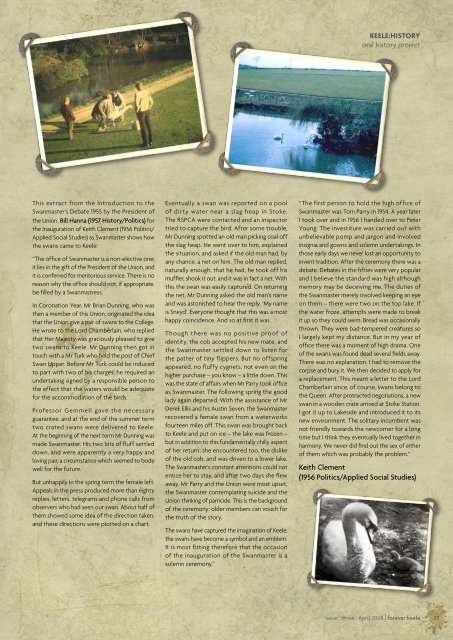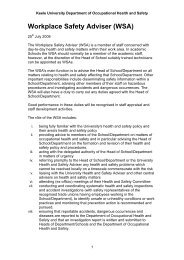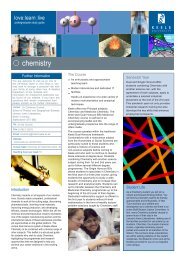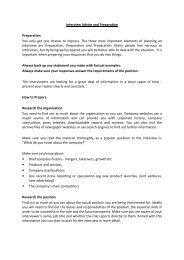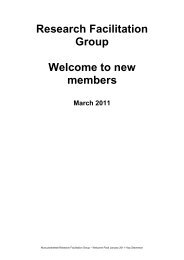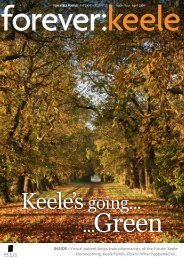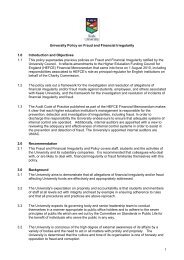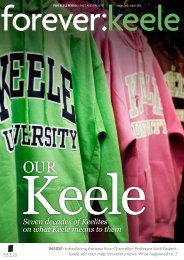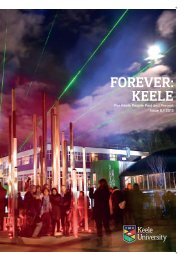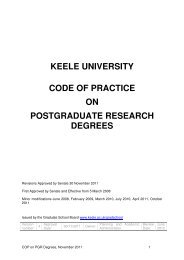Download - Keele University
Download - Keele University
Download - Keele University
You also want an ePaper? Increase the reach of your titles
YUMPU automatically turns print PDFs into web optimized ePapers that Google loves.
keele:HISTORY<br />
oral history project<br />
This extract from the Introduction to the<br />
Swanmaster’s Debate 1955 by the President of<br />
the Union, Bill Hanna (1957 History/Politics) for<br />
the Inauguration of Keith Clement (1956 Politics/<br />
Applied Social Studies) as Swanmaster shows how<br />
the swans came to <strong>Keele</strong>:<br />
“The office of Swanmaster is a non-elective one;<br />
it lies in the gift of the President of the Union, and<br />
it is conferred for meritorious service. There is no<br />
reason why the office should not, if appropriate,<br />
be filled by a Swanmistress.<br />
In Coronation Year, Mr Brian Dunning, who was<br />
then a member of this Union, originated the idea<br />
that the Union give a pair of swans to the College.<br />
He wrote to the Lord Chamberlain, who replied<br />
that Her Majesty was graciously pleased to give<br />
two swans to <strong>Keele</strong>. Mr Dunning then got in<br />
touch with a Mr Turk who held the post of Chief<br />
Swan Upper. Before Mr Turk could be induced<br />
to part with two of his charges, he required an<br />
undertaking signed by a responsible person to<br />
the effect that the waters would be adequate<br />
for the accommodation of the birds.<br />
Professor Gemmell gave the necessar y<br />
guarantee, and at the end of the summer term<br />
two crated swans were delivered to <strong>Keele</strong>.<br />
At the beginning of the next term Mr Dunning was<br />
made Swanmaster. His two bits of fluff settled<br />
down, and were apparently a very happy and<br />
loving pair, a circumstance which seemed to bode<br />
well for the future.<br />
But unhappily in the spring term the female left.<br />
Appeals in the press produced more than eighty<br />
replies, letters, telegrams and phone calls from<br />
observers who had seen our swan. About half of<br />
them showed some idea of the direction taken,<br />
and these directions were plotted on a chart.<br />
Eventually a swan was reported on a pool<br />
of dirty water near a slag heap in Stoke.<br />
The RSPCA were contacted and an inspector<br />
tried to capture the bird. After some trouble,<br />
Mr Dunning spotted an old man picking coal off<br />
the slag heap. He went over to him, explained<br />
the situation, and asked if the old man had, by<br />
any chance, a net on him. The old man replied,<br />
naturally enough, that he had, he took off his<br />
muffler, shook it out, and it was in fact a net. With<br />
this the swan was easily captured. On returning<br />
the net, Mr Dunning asked the old man’s name<br />
and was astonished to hear the reply, ‘My name<br />
is Sneyd’. Everyone thought that this was a most<br />
happy coincidence. And so at first it was.<br />
Though there was no positive proof of<br />
identity, the cob accepted his new mate, and<br />
the Swanmaster settled down to listen for<br />
the patter of tiny flippers. But no offspring<br />
appeared, no fluffy cygnets, not even on the<br />
higher purchase – you know – a little down. This<br />
was the state of affairs when Mr Parry took office<br />
as Swanmaster. The following spring the good<br />
lady again departed. With the assistance of Mr<br />
Derek Ellis and his Austin Seven, the Swanmaster<br />
recovered a female swan from a waterworks<br />
fourteen miles off. This swan was brought back<br />
to <strong>Keele</strong> and put on ice – the lake was frozen –<br />
but in addition to this fundamentally chilly aspect<br />
of her return, she encountered too, the dislike<br />
of the old cob, and was driven to a lower lake.<br />
The Swanmaster’s constant attentions could not<br />
entice her to stay, and after two days she flew<br />
away. Mr Parry and the Union were most upset,<br />
the Swanmaster contemplating suicide and the<br />
Union thinking of parricide. This is the background<br />
of the ceremony: older members can vouch for<br />
the truth of the story.<br />
The swans have captured the imagination of <strong>Keele</strong>;<br />
the swans have become a symbol and an emblem.<br />
It is most fitting therefore that the occasion<br />
of the inauguration of the Swanmaster is a<br />
solemn ceremony.”<br />
“The first person to hold the high office of<br />
Swanmaster was Tom Parry in 1954. A year later<br />
I took over and in 1956 I handed over to Peter<br />
Young. The investiture was carried out with<br />
unbelievable pomp and jargon and involved<br />
insignia and gowns and solemn undertakings. In<br />
those early days we never lost an opportunity to<br />
invent tradition. After the ceremony there was a<br />
debate. Debates in the fifties were very popular<br />
and I believe the standard was high although<br />
memory may be deceiving me. The duties of<br />
the Swanmaster merely involved keeping an eye<br />
on them – there were two on the top lake. If<br />
the water froze, attempts were made to break<br />
it up so they could swim. Bread was occasionally<br />
thrown. They were bad-tempered creatures so<br />
I largely kept my distance. But in my year of<br />
office there was a moment of high drama. One<br />
of the swans was found dead several fields away.<br />
There was no explanation. I had to remove the<br />
corpse and bury it. We then decided to apply for<br />
a replacement. This meant a letter to the Lord<br />
Chamberlain since, of course, swans belong to<br />
the Queen. After protracted negotiations, a new<br />
swan in a wooden crate arrived at Stoke Station.<br />
I got it up to Lakeside and introduced it to its<br />
new environment. The solitary incumbent was<br />
not friendly towards the newcomer for a long<br />
time but I think they eventually lived together in<br />
harmony. We never did find out the sex of either<br />
of them which was probably the problem.”<br />
Keith Clement<br />
(1956 Politics/Applied Social Studies)<br />
issue : three : April 2008 | forever:keele<br />
27


